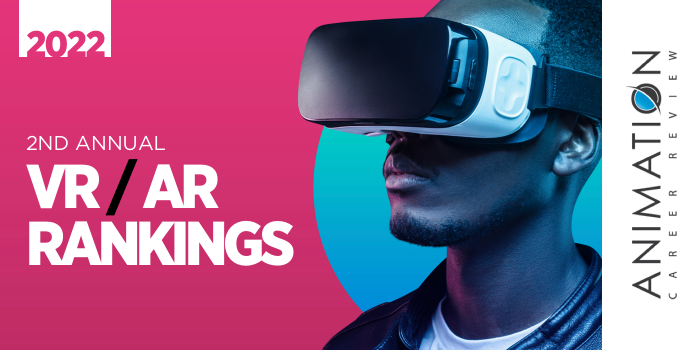University of Southern California (USC) is one of the oldest private research universities in the state. The school opened its doors in 1880 with just 53 students. Today, University of Southern California serves 49,500 students across 22 schools and units. One of USC’s most recognized schools is the School of Cinematic Arts. Founded in collaboration with the Academy of Motion Picture Arts and Sciences in 1929, the USC School of Cinematic Arts is home to the Interactive Media and Games Division, which houses three programs for individuals interested in AR/VR: the Immersive Media Minor, Interactive Entertainment BA, and Interactive Media MFA.
The interdisciplinary Immersive Media Minor is open to all undergraduate students at USC. The program explores virtual reality and how to create content effectively. Students have the opportunity choose elective courses within the same area to fit their goals or they can enhance the curriculum by choosing elective courses from two separate areas. BA students may also study AR/VR through the USC Institute for Creative Technologies (USC ICT), which houses the Mixed Reality Lab (MxR) and the ICT Virtual Humans Group.
The MxR Lab works with the Interactive Media and Games Division in areas such as Human-Computer Interaction (HCI) and immersive systems for education and training simulations using AR/VR.
The ICT Virtual Humans Group conducts research in areas such as Integrated Virtual Humans, Character Animation and Simulation, MultiModal Communication, Natural Language Processing, Cognitive Architecture, and Emotion.
Elective examples for the Interactive Entertainment BA Program include Storytelling for Virtual and Augmented Reality, Alternative Control Workshop, Video Game Programming, Visual Effects, Computer Graphics, Interactive Entertainment, Science, and Healthcare, and Audio Expression. Examples of required courses include Creative Production in Virtual Reality, Experiments in Immersive Design, C++ Programming, and 3D Computer Animation.
The Interactive Entertainment BA Program at USC School of Cinematic Arts explores AAA (triple-A) game development processes and experimental and indie genres from virtual and alternate realities to meaningful and expressive games. Course examples include Reality Starts Here, Producing Interactive Projects, Interface Design for Games, Alternative Control Workshop, Experimental Game Topics, Programming in Python, Interactive Entertainment, and Game Design Workshop.
The Interactive Media MFA is a competitive program that admits just 15 students in the Fall semester only. Program features include the opportunity to take twelve 500-level elective units, access to state-of-the-art computer and digital production facilities, and a mandatory internship or summer job in a professional environment.
MFA students will take courses such as Experiments in Interactivity I & II, Foundations of Artificial Intelligence (AI), Interactive Design Production, Motion Capture Fundamentals, and Tangible and Spatial Computing. To enhance this coursework, like undergraduate students, MFA students can study AR/VR through USC ICT.
USC recently launched the USC Working Group on Scholarly VR, AR, and 3D Modeling. The Group is sponsored by the Humanities in a Digital World Program at USC Dana and David Dornsife College of Letters, Arts and Sciences (the largest and oldest of the USC schools), and the Ahmanson Lab at the USC Sidney Harman Academy for Polymathic Study. Students in all programs benefit from participation in the Groups workshops, lectures, projects, and discussions. Past workshops have explored Mobile Augmented Reality, Immersive 3D Setting Design, and utilizing AR toolkits and platforms such as Niantic (Pokémon Go), Snap (Snapchat lenses), and others.
Graduates of the programs at University of Southern California have been hired at companies and organizations such as Aerojet Rocketdyne, Walt Disney Company, Amazon, Sony, Microsoft, Lockheed Martin, Google, Branded Entertainment Network, Discovery+, Gilead Sciences, VIZIO, Yahoo, DreamWorks Animation, Vayu Technology, the US Army, Disneyland Parks, Disneyland Resorts, United States Navy, META, United Airlines, Department of Homeland Security, Customs and Border Protection, Tesla, Boeing, Oracle, FORD, AT&T, and the Federal Aviation Administration.












